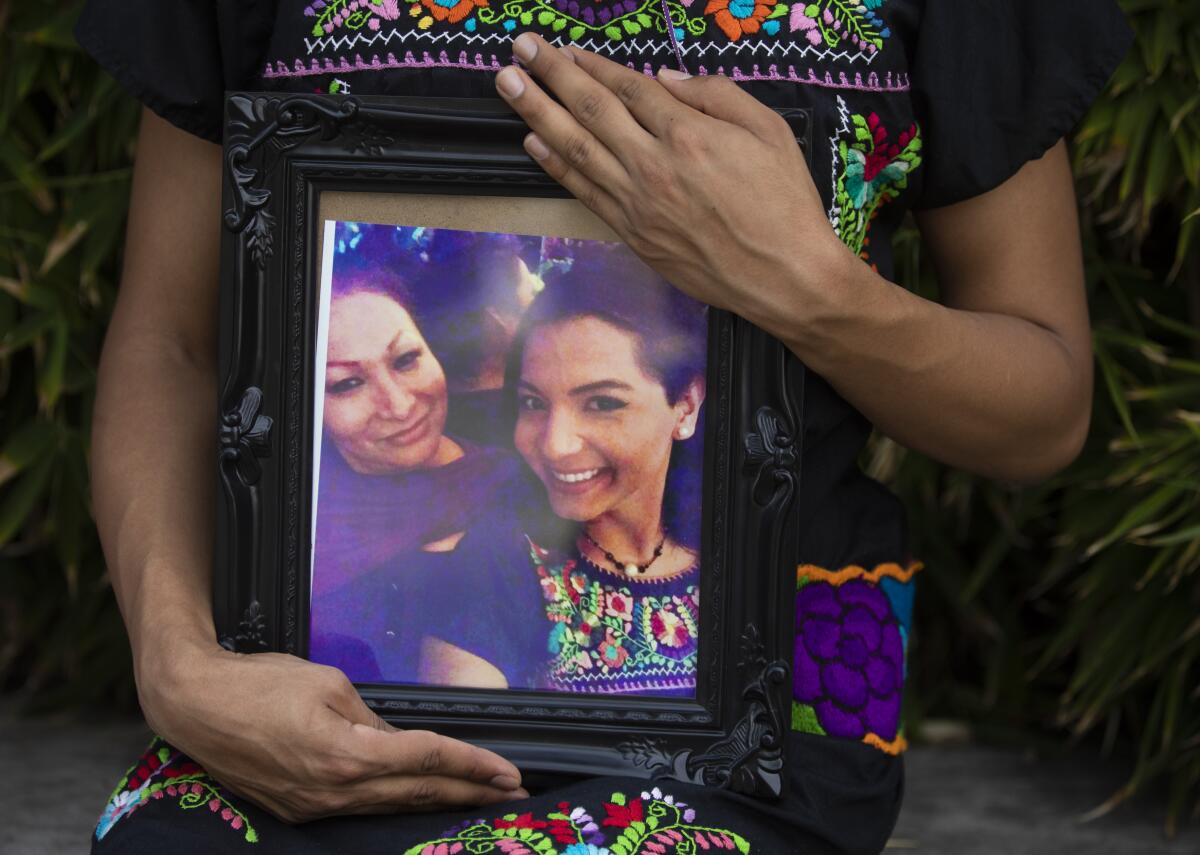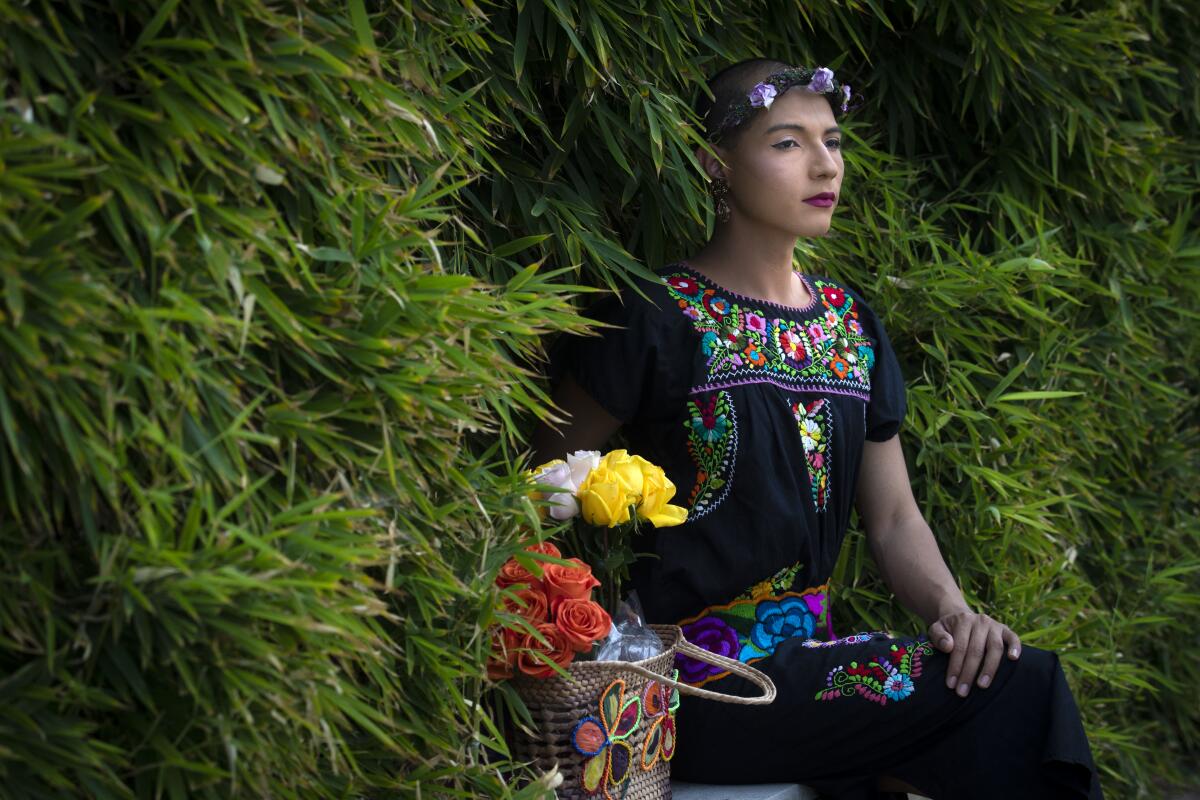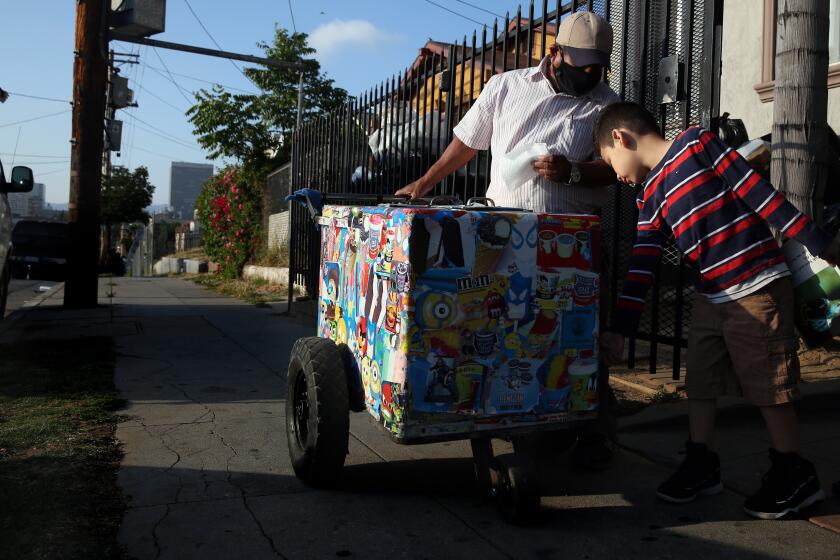Death of an Indigenous essential worker sparks debate over gender identity

- Share via
Angela Martinez died young, her death a tragedy to the many who knew and loved her. Her death became a rallying cry. A controversy. And, ultimately, a tale about identity and being oneself.
Her story begins in San Bartolomé Quialana, a small Zapotec town in the Mexican state of Oaxaca. She came into this world two months prematurely, a tiny newborn who wouldn’t cry or open her eyes. Her parents, who had already lost five young children — some from measles, another from a lump in his throat — feared they would lose her too.
“They prayed to Dios Sol [sun god] to give them a child,” said her brother, Plutarco Martinez.
Her story ends in Los Angeles, where she died last month at age 41. She had worked at a Burger King in Santa Monica, where she was known for her joy and generosity.
“She would always show up with a smile on her face,” said Yolanda Garcia, a co-worker from Tlacolula, Oaxaca. “She was strong and would always offer to help me when I carried the heavy potato boxes.”
But over the last year, Martinez’s health had begun slipping. She had kidney problems and trouble breathing, said Julio Hernandez, her roommate of 23 years. In early July, as the novel coronavirus ravaged Los Angeles, Martinez’s symptoms worsened.
She continued to work, but Garcia and other co-workers began to worry that Martinez had the virus.
One night, Martinez started feeling pain all over her body. Her head throbbed. Hernandez offered to call an ambulance. Martinez refused. She feared catching COVID-19 in the hospital.
“Estás pendejo. ¿Quieres que me maten ahí?” Martinez told Hernandez. “You’re dumb. Do you want them to kill me there?”
Martinez died at home on July 6 in Hernandez’s arms.
Hernandez suspected she died of a heart attack. Her co-workers thought it was COVID-19, a fact eventually confirmed by the coroner in August. But initially her manager at Burger King blamed it on a “hormone overdose.”
The Burger King manager’s assertion, set against the backdrop of a pandemic disproportionately infecting and killing Latino workers in essential jobs, set off a furor, with activists calling it transphobic and bigoted. Martinez’s co-workers prepared to go on strike and called on Burger King to better protect its workers. A social media blitz was unleashed.
Burger King said the restaurant was investigating the manager’s “transphobic” comments, calling them “inaccurate and unacceptable.”
On the Friday afternoon of the strike, protesters in cars and co-workers on foot jammed the drive-through of the Burger King, holding up white roses in her honor and clamoring for people to “say her name.” Dozens of media outlets — Telemundo, Insider, the Sun and ABC News — descended upon the eatery.
A video of the protest — showing demonstrators with posters of Martinez’s face against the transgender pride flag — was posted on Twitter with the hashtag #TransLivesMatter. It quickly went viral.
And that’s when a second controversy unexpectedly began.
Her loved ones accused activists behind Fight for $15, an advocacy group for fast-food workers, of misgendering Martinez on social media and making her the face of a movement of which she never asked to be a part.
Martinez’s friends said she had been meticulous about not referring to herself as transgender. Though Martinez went by “she,” she was neither man, nor woman. She was “muxe.”
::
The muxe identity, which Martinez held dear, has existed as a respected third gender in Zapotec cultures in Oaxaca for centuries, especially in the southeastern area of Istmo de Tehuantepéc. Muxes, pronounced moo-shehs, have coexisted and even become leaders in their communities, said Felina Santiago, a 52-year-old muxe from Juchitán, Oaxaca.
“There’s men, there’s women and there’s muxes,” Santiago said. “I’m in the middle of the two. I’m only muxe.”
The notion of a third gender has existed for centuries in different cultures worldwide. In some Native American cultures, the term “two-spirit” is an umbrella term describing those who fulfill a third gender. In South Asia, there are more than half a million officially recognized hijras. In Thailand, there are the kathoeys. In Ethiopia, the ashtime. And in Polynesia, the fa’afafine.
Gender identity can be a complex and highly sensitive issue — and never more so than after those who don’t conform to the gender binary die, said Drían Juarez, vice president of programming at TransCanWork Inc. And if someone has died, they cannot tell the tale of who they were, or choose the words used to describe them.
“It’s about honoring somebody’s spirit, rather than labeling,” Juarez said. Referring to the discussion following Martinez’s death, “I think it highlights just how multifaceted and complex identity really is.”
Juarez said she believes that Martinez’s co-workers and Fight for $15 likely had the “best of intentions” when initially protesting and using her name.
“Many of Angela’s co-workers understood her to be a trans woman, but we now know that she may have identified otherwise in other circles,” Fight for $15 said in a statement.
The muxe identity, which Martinez held dear, has existed as a respected third gender in the Zapotec culture in Oaxaca for centuries, especially in the southeastern area of Istmo de Tehuantepéc.
In life, Martinez was supportive of her transgender friends, like Pink Moon Midnight Blue, who said Martinez “adored me in my transness.” But that’s not how Martinez saw herself.
“She always found it problematic that her own identity wasn’t addressed correctly in trans spaces,” Midnight Blue said.
Little wonder, then, that friends complained that trans activists were, as Midnight Blue wrote on Facebook, “exploiting her image without permission. She was not trans, my sister was muxe and indigenous people are tired of the erasure of our identities.”

Midnight Blue recalled that when she and Martinez worked at a trans woman-owned El Pollo Loco, where a third of the employees were transgender, National Geographic, — and other media outlets, including the L.A. Times — invited workers to be interviewed for features on the inclusive restaurant.
Martinez declined to participate with a simple phrase, “Aquí, la trans eres tú,” she told Midnight Blue. “Here, the trans woman is you.”
In Martinez’s hometown of San Bartolomé Quialana, there were only a few muxes, and it took some time for Martinez’s family to fully embrace who Martinez was, her brother said. She started her transition after she got to L.A. and it wasn’t until 2008 when the two visited their pueblo that Martinez’s parents saw her express her muxe identity for the first time.
“They received her as their child,” Plutarco Martinez said. “They realized that we’re all human beings and we can’t judge people who were born with that gift. There’s no reason to.”
In Los Angeles, Angela Martinez had embraced her identity with such joy that she was considering running for muxe queen — a title presented at the Vela Muxe, an annual celebration of the Oaxacan culture and identity at Casa Vertigo in downtown Los Angeles, said Janel Castañeda, a close friend of six years.
The L.A. celebration mirrors the colorful and food-filled festival in Juchitán, where it originated. There, thousands of tourists celebrate the Indigenous traditions of the community and locals crown a muxe as queen.
“She wanted to be queen,” Castañeda said. “In my eyes, she already was one.”
::
On a typical day before work, Martinez would fix herself un cafecito using the Oaxacan coffee beans that made her reminisce about her hometown.
As she sipped her coffee, she fed and watered her “children”: some stray cats, her rescued Chihuahua named Daisy (after TV host Daisy Fuentes), and her houseplants. She was especially fond of orchids — beautiful and delicate but notoriously finicky — and had a knack for reviving them when they were close to death.
For the past 16 years, Mauro Rios Parra has sold fruit bars and ice cream on the streets of Pico-Union, one of L.A.’s densest cities and among the hardest hit by the coronavirus.
Each day, she caught the bus, finishing her makeup and listening to Alejandra Guzman and Los Héroes del Silencio on her way to work at Burger King.
The group that fully embraced Martinez in her muxe identity was her beloved pandilla. Her gang. Her friends, who included Midnight Blue and Castañeda, loved her as the “heart and glue” of the group.
La pandilla got together every Thursday to bowl at Shatto 39 Lanes in Rampart Village or to sing karaoke at Martinez’s house. Martinez’s witty humor kept the group laughing. She could take just about any random word and make a joke of it.
“¿Por qué somos de lo peor?” she would ask, jokingly. “Why are we the worst?”
A few years ago, Midnight Blue was staying in a shelter after leaving a toxic partner. Martinez immediately asked her to come live with her, even if space was tight. Midnight Blue was one of the nearly half a dozen people to whom Martinez gave a place to sleep.
“I immediately found a sister,” Midnight Blue said. “I realized then that her kindness was not of any other person that I knew.”
Midnight Blue said they would talk for hours into the night, watching the stars in the sky. No one knew exactly why she chose the name Angela, but her house was filled with trinkets, sculptures, paintings and antiques depicting angels. She even had angel wings tattooed on her back.
“One time she asked me, ‘Do you think angels exist?’” Midnight Blue said. “Her greatest wish was to see an angel. I think she forgot that she was one of them.”
More to Read
Sign up for Essential California
The most important California stories and recommendations in your inbox every morning.
You may occasionally receive promotional content from the Los Angeles Times.












